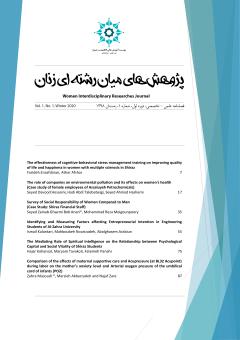The Mediating Role of Spiritual Intelligence on the Relationship between Psychological Capital and Social Vitality of Shiraz Students
Subject Areas : Other related topicsHajar Kohansal 1 , Maryam Tavakoli 2 , Fateme Panahi 3
1 -
2 -
3 -
Keywords: Spiritual Intelligence, Psychological Capital, Social Vitality, Students.,
Abstract :
Target: The purpose of this study was to investigate the mediating role of spiritual intelligence on the relationship between psychological capital and social vitality of Shiraz university students. Method: The research is descriptive and correlational. The statistical population of this study consisted of Shiraz University students in year 98. A total of 200 subjects were selected by convenience sampling from which 174 females and 28 males. Data were collected using King's Spiritual Intelligence Questionnaires, Lutz Psychological Capital, and Oxford Happiness Questionnaires. The data were analyzed by SPSS software using descriptive statistics, Pearson correlation coefficient, and regression. Findings: The results showed that the components of psychological capital, hope, and resilience were able to predict social happiness positively and significantly, and also the components of spiritual intelligence, critical thinking, personal meaning production, and awareness expansion, were able to predict social happiness. Positive and significant predictors and variables. Psychological capital and spiritual intelligence as the predictor variable and social vitality variable as the criterion variable were able to predict positive and significant social happiness, so it can be said that spiritual intelligence has a significant and mediating role between hope and optimism with social vitality. Conclusion: Based on the present results, it can be suggested that ways of enhancing spiritual intelligence in learning skills are to increase social vitality and hope among students since students have a basic need for these skills and this is an important issue with the implementation of the course. Training for students in different situations can also be effective
1- ارزانی، غلامحسین.، باصری، احمد. (۱۳۹۴). پیشبینی رضایت از زندگی با تاکید بر هویت دینی، با قدرت تابآوری و امید به زندگی در کارکنان یک واحد نظامی و انتظامی. مجله روانشناسی نظامی، ۵ (۷): 23-33.
2- بهادری خسروشاهی، جعفر، هاشمی نصرت آباد، تورج؛ باباپور خیرالدین، جلیل (1391). رابطه سرمایه روانشناختی با سرمایه اجتماعی دانشجویان دانشگاه تبریز. مجله تخصصی پژوهش و سلامت، مرکز تحقیقات توسعه اجتماعی و ارتقای سلامت گناباد. دوره 2. شماره 1.
3- تمیزیفر، ریحانه. (۱۳۹۳). نشاط اجتماعی: تحلیل جامعهشناختی عوامل موثر بر نشاط اجتماعی شهر اصفهان. ناشر: دفتر تبلیغات اسلامی حوزه علمیه قم.
4- توکلیزاده، جهانشیر.، رزاز مشهدی، زهرا.، تقوی بهبهانی، سید مجید. (۱۳۹۰). شادکامی از دیدگاه مولوی و روانشناسان مثبت گرا. ناشر: قلم.
5- حاجلو، نادر، جعفری، عیسی. (۱۳۹۳). رابطه بین بهزیستی معنوی و امید با رضایت از زندگی در سالمندان. فصلنامه روانشناسی و دین، ۲۸ (۱): ۲۸-۳۹.
6- رضایی شهسوارلو، زهرا.، لطفی، محمدسجاد.، تقدسی، محسن.، موسوی، معصومه سادات.، یوسفی، زهرا.، امیرخسروی، ندا. (۱۳۹۳). ارتباط بین مؤلفههای سلامت معنوی با امید و رضایت از زندگی در سالمندان مبتلابه سرطان در شهر کاشان ۱۳۹۲. فصلنامه پرستاری سالمندان.۱ (۲): ۴۳-۵۴.
7- عنبری، م. (1391). بررسی زمینهها و راهکارهای نشاط اجتماعی در ایران، تهران: شورای عالی انقلاب فرهنگی.
8- مرندی، سیدعلیرضا.، مصباح، مجتبی. (۱۳۹۲). سلامت معنوی از دیدگاه اسلام (مفاهیم، شاخصها، مبانی). انتشارت حقوقی.
9- مظاهری، منیر.، فلاحی، مسعود. (۱۳۹۲). معنویت و معنویت درمانی، انتشارت بهزیستی.
10- Alradaydeh, M. t. F. (2018). Spiritual well-being, perceived social support, and life satisfaction among university students AU - Alorani, Omar Ismael. International Journal of Adolescence and Youth, 23(3), 291-298. doi:10.1080/02673843.2017.1352522
11- Du, H., Bernardo, A. B. I., & Yeung, S. S. (2015). Locus-of-hope and life satisfaction: The mediating roles of personal self-esteem and relational self-esteem. Personality and Individual Differences, 83, 228-233. doi:https://doi.org/10.1016/j.paid.2015.04.026
12- Karimi Munegi H, Akbari M, Makarem A, Esmaeeli H, Ebrahimi M. [Fleetwood is the relationship with the spiritual intelligence abilities taught in medical school faculty members]. Iranian J Med Educ. 2014;8(12):554-63.
13- Luthans, F.; Youssef. C.M. & Avolio, B.J. (2007). Psychological capital: Developing the human competitive edge. United Kingdom: Oxford University Press: 189-91.
14- Moallemi S, Raghibi M, Salari Dargi Z. [Comparison of spiritual intelligence and mental health in addicts and normal individuals]. J Shahid Sadoughi Univ Med Sci. 2010;18(3):234-42
15- Weber, S. R., & Pargament, K. I. (2014). The role of religion and spirituality in mental health. Curr Opin Psychiatry, 27(5), 358-363. doi:10.1097/yco.0000000000000080
16- Yang, Y., Zhang, M., & Kou, Y. (2016). Self-compassion and life satisfaction: The mediating role of hope. Personality and Individual Differences, 98, 91-95. doi:https://doi.org/10.1016/j.paid.2016.03.086
17- Zohar, D. & Marshal, L. (2002). “Cultivating spiritual intelligence to heal diseases of meaning: xConference reported by Davidson”, Contemporary Nurse, 2(12), 103-105.


